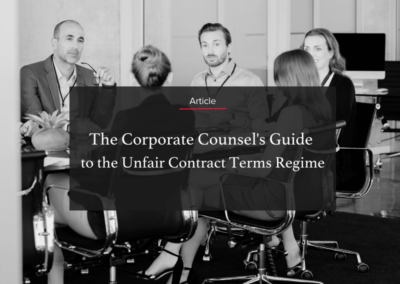The High Court delivered two judgments on 8 February 2023 to bring about the most significant development to the unfair preference laws and ended many years of uncertainty in relation to the defence of set-off and the application of the running account principle.
For many years, there has been heated debate as to whether:
-
- set-off is available as a defence to an unfair preference claim; and
- the “peak-indebtedness rule” is part of the law in Australia.
The High Court decisions of Metal Manufactures Pty Limited v Morton [2023] HCA 1 (Morton) and Bryant v Badenoch Integrated Logging Pty Ltd [2023] HCA 2 (Badenoch) has finally put an end to the debate by rejecting the applicability of the set-off defence and peak-indebtedness rule once and for all.
This article covers:
- What do creditors need to know
- What do insolvency practitioners need to know
- Set-off and the decision of Morton
- The running account principle and Badedoch
What do creditors need to know?
The key takeaways for creditors from the decisions are as follows.
Expect an increase in unfair preference claims.
The decisions have given certainty to insolvency practitioners who may have been refraining from taking action to await the outcome of the decisions to avoid the need to contend with creditors relying on the aspects of uncertainty that fell in their favour.
There are still other defences available.
Set-off was only one defence available to creditors in response to an unfair preference claim. Creditors may still raise matters such as good faith, the running account and security in response to a claim. Creditors should be diligent in employing risk mitigation strategies to reduce any potential liability from unfair preference claims by ensuring they have security in place and practice sound credit management.
Put the liquidator to task.
Liquidators frequently ignore the running account when issuing unfair preference demands and will seek each and every payment received during the 6-month period prior to liquidation. Understanding that a running account may apply to the claim against you and putting it back on the liquidator to properly calculate its claim may result in it being significantly diminished or defeated.
What do Insolvency Practitioners need to know?
The key takeaways for insolvency practitioners from the decisions are as follows:
Certainty.
Liquidators can sleep easy knowing they will no longer need to deal with the trivial set-off defence by a creditor to stifle what may be a strong unfair preference claim.
There is no one-size-fits-all approach to s 588FA(3).
Liquidators will need to consider all of the relevant objective facts in a commercial context in determining whether a transaction is an integral part of continuing business relationship. The purpose of the payment is only a relevant factor.
Wider application for Morton.
The High Court did not directly deal with the applicability of section 553C to claims such as an insolvent trading claim, however, it is likely that it will equally apply to such a claim for the same reasons given it only arises as a right to the liquidator under section 588M(2) following the commencement of the winding up and there is no mutuality.
Set-off and the decision of Morton
Section 553C of the Corporations Act 2001 (Cth) (Act) provides for an automatic set-off where there are mutual credits, debts or dealings between a creditor and an insolvent company.
Prior to the Morton, creditors facing unfair preference claims would raise a set-off as a defence to an unfair preference claim if the creditor was still owed a debt by the insolvent company. For example, if the creditor was owed $400,000 at the date of liquidation and the liquidator had an unfair preference claim against the creditor for $500,000, the creditor would seek to set-off the debt against the claim to reduce it to $100,000.
The High Court unanimously held in favour of the liquidator in Morton that it is not permissible for creditor to raise a set-off under section 553C of the Act in defence to an unfair preference claim for the following reasons:
-
- Section 553C is concerned with claims or debts that subsisted before the commencement of the winding up and not those which straddle the period before and after.
- A liquidator’s (and not the company’s) right to sue a creditor in relation to a voidable transaction under section 588FF(1) of the Act did not exist at the time immediately before the winding up.
- There was no mutual credit, debt or dealing because the dealing was not between the same persons (one being between the creditor and company and the other between creditor and liquidator) and the liquidator’s claim was not for the company’s benefit but for the benefit of the general body of creditors.
The running account principle and Badenoch
Section 588FA(3) of the Act provides for what is commonly referred to as the “running account principle”. The principle applies where a transaction is an integral part of a continuing business relationship and the net indebtedness increases and reduces from time to time as part of the relationship. If applicable, the transactions will be viewed as a single transaction rather than in isolation and will usually result in a reduction of the creditor’s liability in response to an unfair preference claim.
Over the past 60 years, concepts such as the “peak-indebtedness rule”, “business purpose common to both parties” and “mutual or dominant assumption” have been introduced by various court decisions. These concepts effected how the single transaction was calculated and whether a payment was an integral part of a continuing business relationship.
The “peak-indebtedness rule” allowed liquidators to determine the point in time from which they calculated the single transaction by subtracting the amount owing to the creditor as at the relation-back day from the point of peak indebtedness. This allowed the liquidator to ignore transactions prior to this date and increase the quantum of their claim.
The High Court finding in favour of the creditor unanimously held in Badenoch as follows:
-
- The natural and ordinary meaning of the words in section 588FA(3) of Act cannot incorporate the “peak-indebtedness rule” without reading in words which would be inconsistent with the policy underlying the statutory embodiment of the running account principle.
- Whether a transaction is an integral part of a continuing business relationship is a matter of fact involving an objective ascertainment of the “business character” of the transaction. The purpose of the payment and intentions or assumptions of the parties may be relevant to this ascertainment, but they are not determinative.
The decisions of the High Court may not come as a great surprise to most, but they now provide creditors and insolvency practitioners with more certainty in approaching unfair preference claims.
Any party prosecuting or defending an unfair preference claim should re-familiarise themselves with the state of the law and be appropriately advised of their legal position in view the decisions.
Results Legal are specialists in insolvency law and can assist with any concerns you have in relation all aspects of insolvency, including the implications of these decisions.






![[Webinar] Unfair Contract Term Changes are Imminent [hosted by BICB]](https://resultslegal.com.au/wp-content/uploads/2023/08/Webinar-The-New-Unfair-Contract-Terms-400x284.jpg)
![[Webinar] The New Unfair Contracts Terms: What it means for your business](https://resultslegal.com.au/wp-content/uploads/2023/05/Webinar_The-New-Unfair-Contract-Terms-400x284.jpg)
